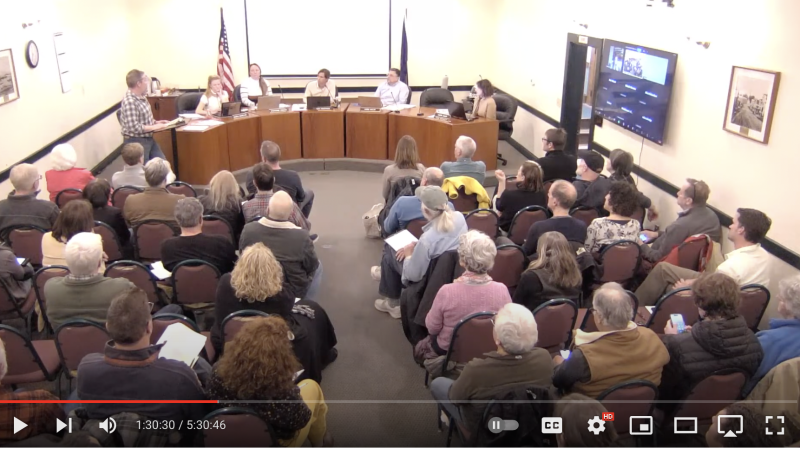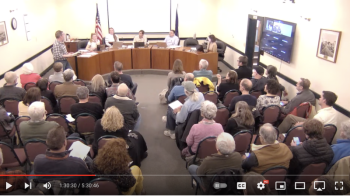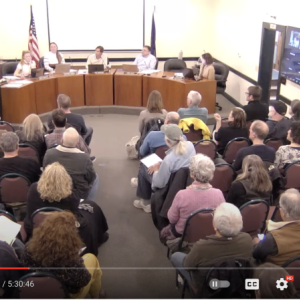Whether to regulate Camden’s short-term rentals with new standards is now up to voters
CAMDEN — More than three hours were dedicated Tuesday evening, April 2, to a hearing on proposed new regulations governing short-term rentals in Camden. In the end, the Select Board compromised on a modified package to place on the Town Meeting warrant that will appear before voters at the polls June 11.
Most notably, the idea of capping the number of commercial short-term rentals across town was removed, as was an accompanying lottery system for getting a permit for a commercial STR.
It was a marathon hearing where citizens filed to the podium for a three-minute turn (clocked by a phone that dinged time warnings) at expressing their opposition or support of the regulations that had been crafted by the Camden Planning Board and municipal planning office.
Whether or not Camden joins other Maine municipalities, such as Bethel, Cape Elizabeth, Freeport, Gray and Bar Harbor, in regulating how property owners provide lodging for overnight paying guests for the short-term — less than a month, as proposed in Camden’s case — will now be up to Camden citizens to decide.
As the evening unfolded, concerns reflected multiple perspectives.
Town Planning and Development Director Jeremy Martin, who presented the package of proposed regulations, advocated for a STR registration system, as well as rules instituted for the sake of safety and community health.
He described STRs in Camden in which beds had been placed in basements with no window for egress, or three-bedroom homes advertising accommodations for 11 guests, without accompanying sewer system capacity.
Martin cited the need for inspections of STRs every three years, tasks including the measurement of ceiling heights, availability of escape windows, as well as assessment of fall protections and electrical systems.
He referenced contractual services that would handle systemizing STRs in Camden. Those contractors would charge approximately $14,000 annually to count and track each individual STR.
Currently, the number of STRs in town ranges between 30 and 210 and 400. The discrepancy of the latter are attributed to different vacation rental platforms that host advertising for STRs.
The “30” number is how many STR property owners registered with the town following the effort Camden made two years ago to require registration of properties that were stand-alone STRs, without a property owner residing on-premise.
While Martin and Planning Board Chair Ethan Shaw, and Planning Board member John Cole, who clarified at the meeting that his comments were his own as a citizen and not of the board, all said STRs should be subject to regulations like other businesses, there were other citizens at the meeting questioning the extent of new rules, and language ambiguity contained within them.
“I would need a lawyer to sift through all the STR nuances and requirements,” said Rolanda Klapatch, owner of two homes in Camden.
“Let’s be sensible,” she said, citing the number of new and complicated rules. “This is Maine, and while I think it should be clean, and I think it should be safe, and I agree with all the things about safety, I do not think the Planning Board should be developing rules for the entire town that you would normally see with a homeowner’s association.”
She and others disputed the reasoning that the number of STRs detracted from availability of long-term rentals in town that would, instead, be occupied by area workers.
Two innkeepers spoke on the need for safety and registration standards to ensure a level playing field amongst traditional lodging establishments and STRs.
Oscar Verest, proprietor of the Camden Harbour Inn, as well as an owner of an STR, questioned the proposed lottery system structure, asking if a commercial STR owner would need to apply annually for a permit to operate a rental unit.
Martin responded yes, and that the process for such a lottery would be developed.
Verest suggested structuring it instead as a first-come, first-served system.
“Do it like the [Camden Harbor] mooring list,” he said. “Not like, this year you can moor your ship and next year you cannot.”
Camden resident and realtor Brian Wickenden cited the lack of hard data on the existing number of STRs in town.
“My main takeaway is you do not know how many STRs there are in town,” he said. “You are starting off with bad information from the get-go.”
He advised there is a need for a lot more information, “before we can make a decision, as a town.”
Camden resident Bill Laurita asked what the registration fee would be.
Martin said, “should it be approved, in the Fall the Select Board would come up with a fee.”
He said his department suggests the fee covers the cost of hiring a contractor to oversee the registration system.
“I do not envision any need for new employees,” he said, adding that the fee would represent the cost of a $14,000 contract with a third party.
One commercial STR owner who had registered with the town said the fee was $100 in 2023, and $200 in 2024.
Camden resident Richard Benner owns an STR unit in a house next to his house.
“These STRs are not providing housing for any people looking for work around here,” he said. “I am not opposed to putting regulations on STRs, but what we need to stop are commercial STR rentals in neighborhoods.”
He described a small house in his neighborhood that, “used to be owned by a little old lady; now nobody can afford to buy it.”
Others spoke about the lengthy list of proposed STR regulations, which include:
• A certificate of insurance demonstrating there is property insurance and general liability insurance on the property appropriate to cover the rental use in the aggregate of not less than $1,000,000 or evidence that the Short-Term Rental Owner conducts short-term rental transactions through an Internet hosting platform that provides equal or greater coverage.
• Registration required for all STRs;
• Proof of adequate septic system/drain field capacity;
• An acceptable Informational Packet as approved by the Town, or its designee, must be provided to short-term rental Transient Occupants for each stay and must be posted within the rented dwelling. This packet must include the following information:
- Fire escape routes and emergency exits;
- 24-Hour Emergency Contact;
- Trash pick-up;
- Noise violation standards.
• Provide abutting property owners informing them that a license has been granted by the town.
• The Licensee must upload a calendar on any website or online advertising service that the Licensee uses to advertise the Short-Term Rental. The advertisement must contain the unique licensing number assigned to that specific Short-Term Rental and the calendar must provide information concerning the dates during which the Short Term Rental is booked, and reservation cancellations for the Short-Term Rental.
• No advertising or identifying mechanisms, such as signage, including lawn signage, identifying a property for rent as a Short-Term Rental shall be installed on the Short-Term Rental property.
If approved, the STR owner would be issued a license card with a unique license number. Those licenses would be one-year only and renewal applications would be required before Jan. 1 of each new year.
While residents continued to speak at the hearing, they urged the Select Board to wait before putting the proposed regulations before the town for a vote. They said the process was, “too last minute” and drafted without a robust picture of current rentals in town.
Others countered that such data would only be produced by requiring registration of STRs, as outlined in the proposed ordinance amendments.
“Slow down and get your bearings straight,” said one woman, while another said the proposals were an “over-reach of authority.”
“This is happening too fast,” said Margaret Rauenhorst, of Camden. “There is not enough information and it is being pushed through.”
Christopher Rheault, Planning Board vice chair, said the conversation about STRs began during the Covid pandemic, in 2020-2021.
“It is a little frustrating to hear it is being described as a rushed process,” he said, suggesting Camden put it forward, “so the entire town can weigh in on it.”
Select Board deliberates
After the public had its opportunity to comment on the proposed STR regulation package, which comprises three warrant articles (amending chapters 290 and 215 in town ordinance) for June Town Meeting, the Select Board opened its conversation.
Select Board Alison McKellar said she had a conflict of interest, given that she owns an STR in Lincolnville.
“I am familiar with many aspects of this,” she said.
Her STR is lucrative, and if she would not be able to rent, she would have to sell it, she said.
“I understand how many people want to keep property in the family, for sentimental reasons,” she said.
McKellar said the STR issue arose almost seven years ago with the Select Board, and she was concerned about how the current ordinance, which governs some STR registration, “already takes significant town staff time.” She added: “I agree with those who say Jeremy [Martin] underestimates how much time it will take.”
She endorsed establishing the STR categories but did not favor instituting the recommended 150 commercial STR unit cap, as proposed.
“There are some things that make sense,” said board member Chris Nolan. They include, he said, public safety requirements and the resulting level playing field with traditional lodging establishments.
But, he said, the lottery system on commercial STR units would not result in good fiscal planning for property owners.
“I don not budget my house expenses on whether I win the lottery or not,” he said. “If STRs need a lottery it does not make sense. It is not a moose hunt.”
He added, “getting the data is more important than ramming this through.”
Board member Stephanie French agreed.
“I do not think the Planning Board rushed this through, I just do not thing we have the time to look at this properly,” she said. “I think we have a lot of good things in here, and a starting platform. Safety requirements should be foremost of anything we put through.... I am supporting of the thought process but I do not think we are quite there, yet. I think we are close.”
Board Chair Tom Hedstrom, however, was supportive of STR registration, saying he believes that STRs have changed neighborhoods, and that safety measures are important.
Not favoring an initial cap on commercial STRs or a lottery system, he suggested moving a package forward to voters that required registration, and then take a year or two to assess the results.
Hedstrom made a motion to move to adopt amendments to the proposed new regulations, including the removal of the 150 cap on commercial STR.
McKellar seconded that motion, but both French and Nolan voted again the motion, resulting in its defeat. (Select Board member Sophie Romana was absent from the meeting).
French said she would be, “opening to revisiting this when there is more time.” She said, “I don’t think it should die here, but more work has to be done.”
Nolan said he was unsure whether adding regulations assisted with the housing shortage, overall, and noted a need for data on existing STRs.
McKellar said the benefit of the regulations, and the required registration, would generate more revenue specific to the issue.
“Currently, it is on the taxpayer,” she said.
“Is there anything to make this more palatable to you,” Hedstrom asked Nolan and French.
The board members then began combing through the regulations, including a requirement that property owners with STRs would have to send notification to abutting property owners about their STRs. The board subsequently deleted that section, as they did a section on violations, excepting one provision: That any licensee who, without good case, fails to timely respond to inquiries made the town within a 48-hour period. The Board changed the latter to 72 hours.
Another motion was made, this time passing 4 to 0, to send the short term rental revised package to voters.
Martin said he would incorporate the Select Board changes to the document. He will be posting those changes to the town webpage dedicated to the short-term rental topic in the near future.
Reach Editorial Director Lynda Clancy at lyndaclancy@penbaypilot.com; 207-706-6657



























